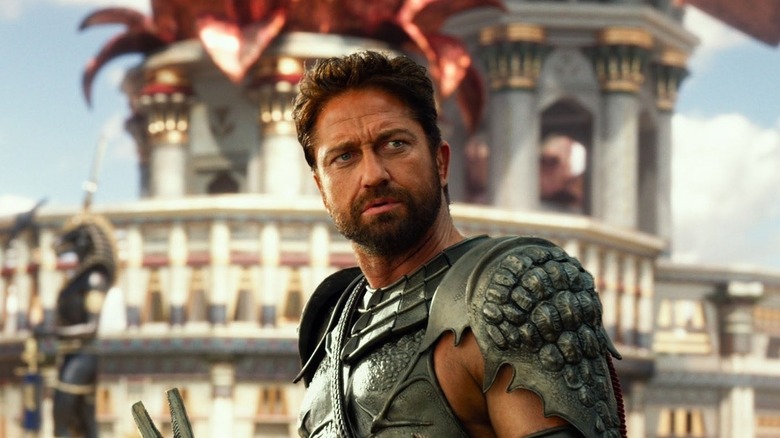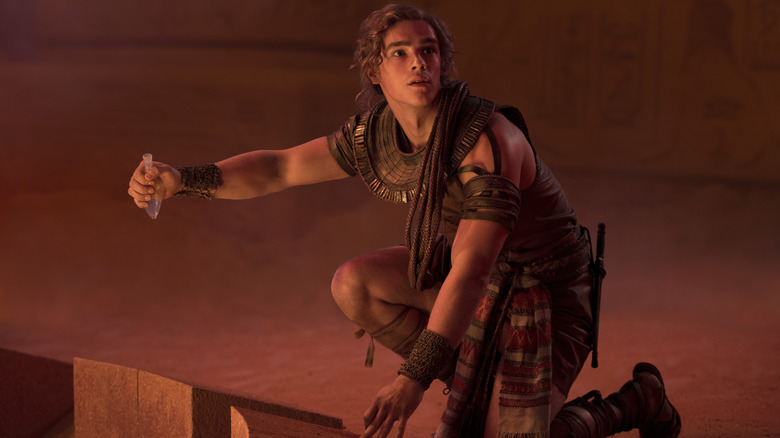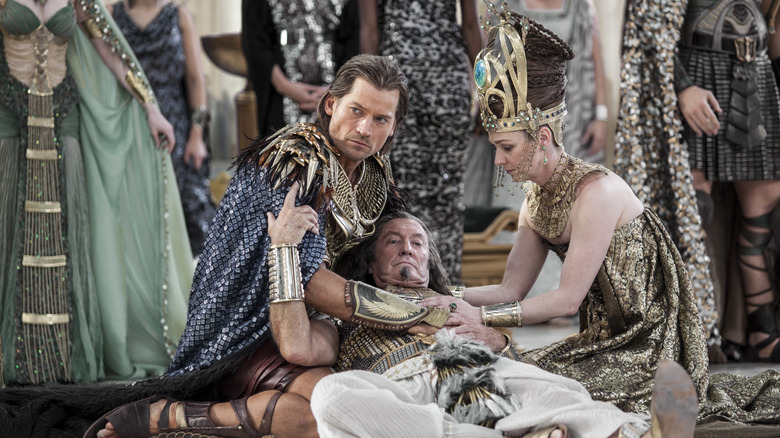Box Office Flop Gods Of Egypt Was Meant To Kick Off An Entire Franchise
Nobody sets out to make a movie that will fail, be it a tiny independent production or the biggest of big blockbusters from a major studio. On the flip side, occasionally arrogance of a sort sets in and there is an element of presumed success with a film, and those projects — more often than not — feel doomed to fail. Such was the case with Lionsgate's 2016 big-budget fantasy play "Gods of Egypt," which bombed spectacularly upon its initial release. Yet, lofty ambitions existed as this was eyed as just the first entry in a brand new franchise. Before it all went to hell, that is.
The film, directed by Alex Proyas ("The Crow," "I, Robot"), cost a whopping $140 million to produce before marketing, putting it firmly in gigantic blockbuster territory. But it made a paltry $31 million in total at the domestic box office and topped out at $150 million worldwide. Per Variety, Lionsgate claimed its financial exposure was only around $10 million thanks to covering the budget through foreign pre-sales of the rights and tax incentives, but that always seemed difficult to believe.
Whatever the case, the film was a flop by any measure right from the jump following its disastrous $14 million opening weekend. But Lionsgate didn't see it that way in the weeks leading up to the rollout. In a press release for the IMAX roll-out at the time, Lionsgate Motion Picture Group Co-Chairs Rob Friedman and Patrick Wachsberger talked highly of a possible new franchise, boasting:
"'Gods of Egypt' and our other upcoming films scheduled for IMAX release, 'The Divergent Series: Allegiant' and 'Deepwater Horizon,' underscore the commercial strength and vibrancy of a slate that is loaded with franchises, potential franchises and star-driven event films."
The controversy didn't help matters at all
There is much to be said for what went wrong here, but it's worth pointing out that fantasy films very rarely do well at the box office, with "The Lord of the Rings" being the exception, not the rule. Even "Thor" only truly got a pass because it was connected to the Marvel Cinematic Universe. That being the case, this was always going to be an uphill battle. Scathing reviews certainly didn't help (it holds a dreadful 15% on Rotten Tomatoes), while a major controversy surrounding the film ahead of its release created a great deal of bad press.
The film, which stars the likes of Gerard Butler ("Olympus Has Fallen"), Nikolaj Coster-Waldau ("Game of Thrones"), and Brenton Thwaites ("The Giver"), takes place in a fictional version of Ancient Egypt. But with so many white actors at the forefront, Lionsgate and Alex Proyas were accused of white-washing. Yes, the late Chadwick Boseman ("Black Panther") and Elodie Yung ("Daredevil") were in the cast as well, but they weren't the leads. The studio apologized ahead of the film's release, but Proyas had his own way of addressing the situation. In a Facebook post (via Forbes) a couple of months ahead of the movie's premiere, the filmmaker made his case:
"As I have already mentioned the world of 'Gods of Egypt' never really existed. It is inspired by Egyptian mythology, but it makes no attempt at historical accuracy because that would be pointless — none of the events in the movie ever really happened. It is about as reality-based as 'Star Wars' — which is not real at all... Maybe one day if I get to make further chapters I will reveal the context of the when and where of the story. But one thing is for sure — it is not set in Ancient Egypt at all."
A disaster to learn from
At the time of the film's release, Lionsgate was struggling to fill the hole left behind by lucrative franchises like "The Hunger Games" and "Twilight," which had recently wrapped up their respective runs. Yes, "John Wick" was about to become huge a year later with its first sequel, but the studio was still trying to compete in the big-budget, blockbuster arena after having a taste of that success. In truth, however, they've tended to do better with mid-budget plays such as "Warm Bodies" and "Kick-Ass." In chasing the next big franchise, they wound up suffering several huge flops — not just "Gods of Egypt," but also with "The Last Witch Hunter," "Ender's Game," and even 2017's "Power Rangers."
As for "Gods of Egypt," even though Lionsgate claimed its financial exposure was low, overall, it probably lost around $90 million, according to The Hollywood Reporter. This is the devil that follows when success is presumed, especially when coupled with trend-chasing. No doubt, Lionsgate was looking at hits like Zack Snyder's "300" and thinking they could replicate that, but it was seemingly too little, too late.
More to the point, we've seen assumed success bite other studios in the butt since then. Such was the case with Snyder's own "Batman v Superman: Dawn of Justice," which gave way to "Justice League" and an entire DC cinematic universe that never quite came together thanks to the divisive nature of its early entries. More recently, DC suffered a similar blow thanks to "Black Adam." It's not limited to Warner Bros., either. This way of thinking is often the pathway to a disaster.
Did Lionsgate ultimately learn a lesson from "Gods of Egypt"? Maybe, but in light of the studio's more recent big-budget disasters like "Moonfall," it's hard to say.


